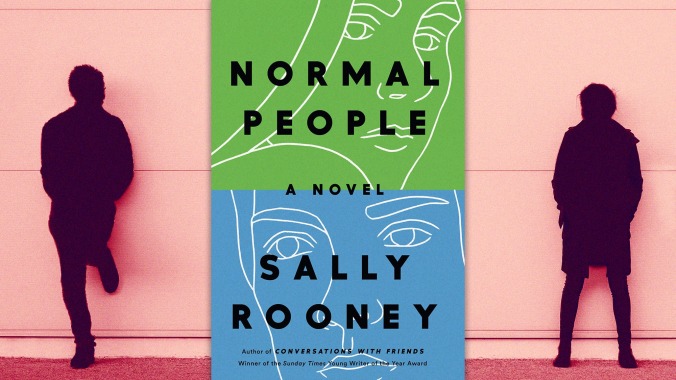In Sally Rooney’s Normal People, the follow-up to her excellent and very popular debut novel, Conversations With Friends, the writer once again turns her attention to exceptional Irish students. Like Bobbi and Frances from her first novel, Connell and Marianne navigate a complicated tangle of class and social dynamics with the added difficulty of a past and potential future of a sexual or romantic relationship.
At the book’s beginning, the pair are in high school. Marianne is from a wealthy family that pays Connell’s mother to clean their house. She is not popular, whereas Connell is smart, athletic, and well-liked. When the two begin sleeping together, Connell insists on secrecy, a cruel decision that interferes with his self-perception as a good guy. Early on, Rooney drills down on this:
[Connell] often makes blithe remarks about things he “wishes.” I wish you didn’t have to go, he says when she’s leaving, or: I wish you could stay they night. If he really wished for any of those things, Marianne knows, then they would happen. Connell always get what he wants, and then feels sorry for himself when what he wants doesn’t make him happy.
Throughout Normal People, Rooney is perceptive to the way that power operates and affects those who have it and those at its mercy. What makes Normal People a more impressive and layered novel than Conversations With Friends is that Rooney is constantly flexing the power dynamics as the contexts around her characters change. There are times when Connell’s gender and physicality is the most dominant force and other times when social capital or actual capital is. Rooney explores the financial world of their relationship thusly:
He and Marianne never talked about money. They had never talked, for example, about the fact that her mother paid his mother money to scrub their floors and hang their laundry, or about the fact that this money circulated indirectly to Connell, who spent it, as often as not, on Marianne.
Marianne’s family money comes up often, and its centrality in her public story creates a much happier image than the truth of the abuse she faced from her deceased father and faces from her brother. When a scary outburst from the latter leaves Marianne with a bloody nose, it’s Connell’s ability to portray himself as capable of enacting lethal violence to protect her that provides closure. Although Rooney convincingly portrays this as necessary, she forces readers to sit with the futility of physical violence of any sort as a means of emancipation from patriarchal violence.
How these components play out in the sexual relationship between the two characters is when Rooney is near her best. During one of their breaks, Marianne informs Connell that she is dating a sadist. “He likes to beat me up,” she says. “Just during sex, that is. Not during arguments.” She goes on to explain that it was her idea, though she expresses repeated ambivalence about it in practice and asks Connell, after declaring that by sharing this information she was being a bad girlfriend, “Who wouldn’t want to beat me up?” Connell replies dryly, “I wouldn’t… Maybe I’m kind of unfashionable that way.”
Later in the novel, when Connell and Marianne are having sex, she asks him to hit her. He declines and she, feeling judged by him for her desires, asks to stop.
I’m sorry I didn’t want to do that, I just think it would be weird. I mean, not weird, but… I don’t know. I don’t think it would be a good idea…
You think I’m weird? she says
I didn’t say that. I just meant, you know, I don’t want things to be weird between us.
How Rooney navigates the difficult politics of this is impressive. She is clear that Marianne’s desires are legitimate while also exploring what the basis of those desires could be. From Connell’s perspective, Rooney again is clear that his disinterest in the act is legitimate but doesn’t let him off the hook for his lingering sense of judgment. The author does not comfortably reconcile the way their power dynamic has played out in the sexual context.
This complexity is one of Normal People’s greatest strengths and is a reflection of Rooney expanding her vision of what a novel can do. In keeping with this, the book is structurally ambitious. Every chapter begins by announcing how much time has elapsed since the close of the previous one. The shortest is five minutes; the longest, seven months. This is mostly in service of fast-forwarding through the time that Connell and Marianne are not on the verge of a romantic entanglement; the book is about them as a couple more than it is about them as individuals. The structure also has the secondary effect of making readers consistently feel they are at an information deficit. Rooney is always starting chapters in the aftermath of something else, filling in the necessary details later. This is simultaneously frustrating and an important part of what makes the book so compulsively readable.
Normal People lacks the sheer force of will that Frances, as a narrator, brought to Conversations With Friends, and the lack of a grounded perspective somewhat diminishes Rooney’s ability to explore some of the political and social avenues that gave her debut its irresistible quality. Despite this, Normal People is a strong book in its own right. Conversations with Friends is a difficult book to follow-up, and Rooney admirably takes risks with structure and point of view. Though these don’t payoff as well as one might hope, it is evidence of a writer thinking seriously about how to approach her craft. Coverage of Rooney has often descended into caricature—claims that she is the “great millennial novelist” are as common as they are misguided—but Normal People reaffirms that her work speaks for itself.












![HBO teases new Euphoria, Larry David, and much more in 2026 sizzle reel [Updated]](https://img.pastemagazine.com/wp-content/avuploads/2025/12/12100344/MixCollage-12-Dec-2025-09-56-AM-9137.jpg)




























